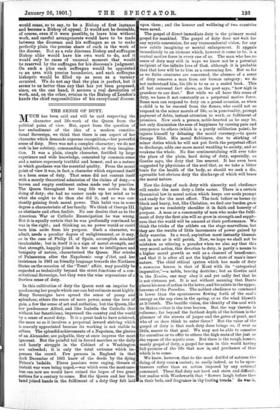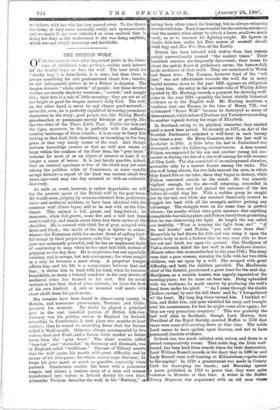THE SENSE OF DUTY.
MUCH has been said and will be said respecting the character and life-work of the Queen from the political point of view. But, apart from the question of her embodiment of the idea of a modern constitu- tional Sovereign, we think that there is one aspect of her character which demands supreme recognition,—her powerful sense of duty. Hers was not a complex character; we do not seek in her subtlety, commanding intellect, or deep imagina- tion. It was a plain, simple character, fortified by large experience and wide knowledge, cemented by common.sense and a nature supremely truthful and honest, and so a nature in which goodness was the essential quality. Prom the moral point of view it was, in fact, a character which expressed itself in a keen sense of duty. That sense did not content itself with a merely theoretical admission of the claims of duty,—a barren and empty sentiment unless made real by practice. The Queen throughout her long life was active in the doing of duty; she had no sooner made up her mind as to what she ought to do than she did it, and so was con- stantly gaining fresh moral power. This habit was in some degree a characteristic of her family. We think of George III. ae obstinate and often foolish. No one doubts that as to the American Wax or Catholic Emancipation he was wrong. But it is equally certain that he was profoundly convinced he wasin the right; and thinking so, no power would or could turn him aside from his purpose. Such a character, we admit, needs a peculiar degree of enlightenment, or it may, as in the case of Philip II. of Spain, accomplish mischief incalculable; but in itself it is a sign of moral strength, and that strength, happily joined in her case to intelligence and benignity of nature, characterised the Queen. Her rebuke of Palmerston after the Napoleonic coup &Rat, and her insistence in 1861 on friendly language towards the Northern States on the occasion of the.' Trent' affair, may possibly be regarded as technically beyond the strict functions of a con- stitutional Sovereign, but they were the wise expressions of a fearless sense of duty.
In this cultivation of duty the Queen sent an impulse for good among her people which one can but estimate most highly. Many Sovereigns have spread the sense of pomp and splendour, others the sense of mere power, some the love of gain, a few the sense of art and testhetics; but the Queen, like her predecessor Alfred, and like Isabella the Catholic (but without her fanaticism), impressed the country and the world by a Bernie of moral duty. It is a great task to have achieved, the more so as it involves a perpetual inward striving which is scarcely appreciated because its working is not visible to Others. The splendid achievements of a Napoleon, the glories of an Alexander, are palpable, they at once impress the most ignorant. But the painful toil in forced marches or the daily and hourly struggle in the Cabinet of a Washington are unheeded; it is only the total outcome which im- presses the crowd. Few persons in England in that dark December of 1861 knew of the deeds by the dying Prince's bedside. Fierce passions were raging, threats of instant war were being urged,—war which even the most care- less can new see would have ruined the hopes of two great nations for a century to come. But the Queen and her hus- band joined bands in the fulfilment of a duty they felt laid
upon them; and the honour and wellbeing of two countries were saved.
The gospel of direct immediate duty is the primary moral gospel for mankind. The gospel of duty does not wait for any mystic conversion, for any transcendental vision, for any new subtle imagining or mental enlargement. It appeals immediately to an element which, however it came to be, ' is a central motive force in every one of us. The man who has, no sense of duty may still in ways we know not be a potential recipient of the infinite love of God, although it is probable that that love will be to him as a consuming fire. But so far as we finite creatures are concerned, the absence of a sense of duty removes a man from our human category; we do not understand him, his life is to us as a sealed book. This all but universal fact shows, as the poet says, "how nigh is grandeur to our dust." But while we all have this sense of duty, we have it not constantly as a perpetual motive force. Some men can respond to duty on a grand occasion, as when a child is to be rescued from the flames, who could not so respond in the minor morals of life, as in punctuality, prompt payment of debts, instant attention to work, or fulfilment of promises. Now such a person, noble-hearted as he may be, not only diminishes the sum of happiness by causing pain and annoyance to others (which is a purely utilitarian point), he injures himself by debasing the moral currency,—to quote George Eliot. His moral flabbiness, due to shirking of minor duties which he will not put forth the perpetual effort to discharge, adds one more moral weakling to society, and so weakens the whole. No fine sentimentalising will ever take the place of the plain, hard doing of duty, especially, as Goethe says, the duty that lies nearest. It has even been suggested by physicians of the soul that, as we take a bitter tonic for the health of the body, so should we seek a dis- agreeable but obvious duty the discharge of which will brace the moral nature.
Now the doing of each duty with sincerity and obedience will render the next duty a little easier. There is a certain dynamical law in moral action which keeps our souls prompt and ready for the next effort. The task before us looms up black and heavy, but, like Christian, we find our burden grow lighter as we resolutely shoulder it in faith and honesty of purpose. A man or a community of men who make the fulfil- ment of duty the first aim will so grow in strength and supple- ness that the world will be amazed at their performance. We think the tricks of the athlete on the stage marvellous, but they are the results of little increments of power gained by daily exercise. In a word, aspiration must instantly blossom out in acts or it will perish. Now, we hope we shall not be mistaken as uttering a paradox when we also say that this very moral action, this devotion to duty, is partly a means to a higher moral growth as well as a channel of beneficence, and that it is after all not the highest state of man's inner nature. The chief ethical system whiCh has made of duty a SUMMUM. born= is that of Kant with its "categorical imperative,"—a noble, bracing doctrine; but as G-oethe said in the %mien, one may obey it and yet sadly feel that he is not virtuous yet. It is not without meaning that Dante places his men of action in the lower, and his saints in the upper, heavens of the Paractiso. The noblest obedience to command is lower than the spontaneous flowing forth of the soul's energy as the sap rises in the spring, or as the wind bloweth as it listeth. The beatific vision, the identity of the soul with its Maker,—that is the true heaven. But the way thereto is toilsome; far beyond the farthest depth of the horizon is the glimmer of the streets of jasper and the gates of pearl, and who of us dare think to enter there ? But the value of the gospel of duty is that each duty done brings us, if ever so little, nearer to that goal. We may not be able to conceive for ourselves or to offer to others the high seats of the just or the repose of the mystic rose. But there is the rough,honest, manly gospel of duty, a gospel for men in this world having full promise of the life that now is, and perchance of that which is to come.
We know, however, that to the most dutiful of natures the doing of duty comes easiest; so easily indeed, as to be spon- taneous rather than an action imposed by any external command. These find duty not hard and stern and difficult, but realise with Wordsworth that "flowers laugh before thee in their beds, and fragrance in thy footing treads." So was it,
we believe, with her who has just passed away. To the Queen the doing of duty came naturally, easily, and spontaneously, and we doubt if she ever admitted or even realised that in doing her duty as she understood it she was doing anything which was not simply necessary and inevitable.



















































 Previous page
Previous page